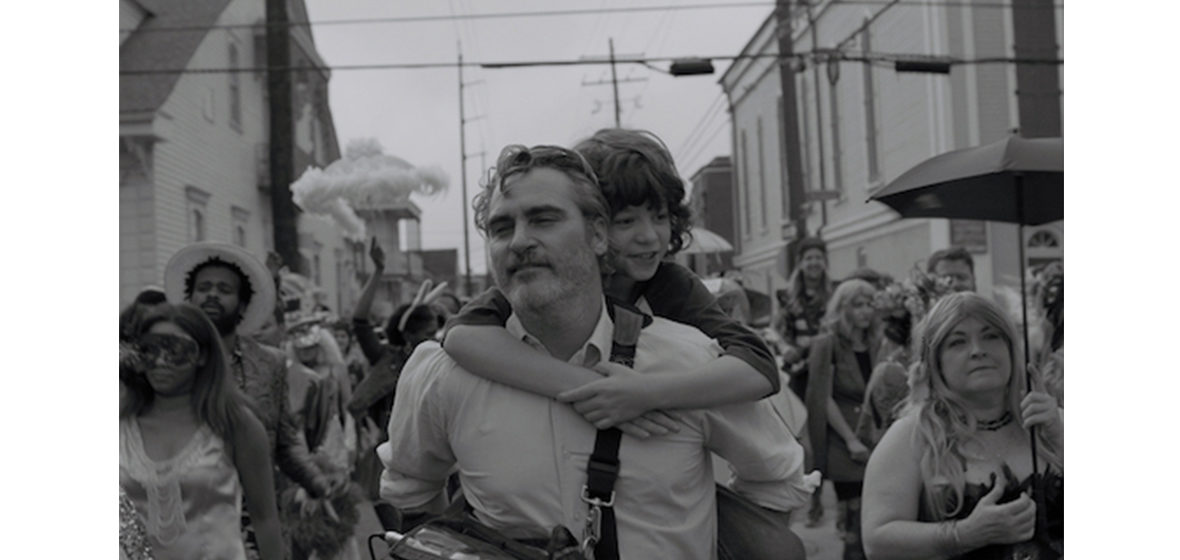Rating: ****
Expectations are the darnedest things. If you had a glimpse at the trailer of C’mon C’mon, the new family drama from Mike Mills, no one would blame you if the black&white/American urban setting to the tune of a soft jazzy Claire de Lune was reminiscent of Manhattan or Frances Ha. All-American stories of upper-middle-class people talking their way through the affairs of their ennui. I understand you need to be in the mood for this kind of parable of philosophical arrested development Frances so well summarised as “quarter-life crisis”. If you thought C’mon C’mon is cut from the same cloth, fear not: for this gentle film has more to say about us, concerned miserable creatures.
Johnny (Joaquin Phoenix) is a radio journalist working on a nationwide piece where children from all over the country are interviewed about their expectations of the future. When his sister Viv (Gaby Hoffman) has to help her bipolar partner Paul (Scoot McNairy), she asks Johnny to look after their child, the young and precocious Jesse (Woody Norman) – the kind of kid that wakes up in the morning blaring Beethoven and seems unfazed by not having many friends. Jesse, we assume, has seen the best and the worst of his mentally unstable father and takes from his mother an honest sincerity. At a certain point, he reveals his mother had an abortion during her crazy years, with the matter-of-factness of a child aware of the bigger picture.
The narrative is framed around two things. First is the cities Johnny and Jesse travel to for their interviews; Detroit, Los Angeles, Oakland, New York and finally, New Orleans. All cities with diverse demographics where the American experience hits slightly differently. Say Detroit, for example, with this destitute and forgotten infrastructure. How can its children have the same outlook on life as someone who lives in the centre of New York? Or someone born in the aftermath of Katrina, trying to understand the harmful effects of gentrification?
These interviews, by the way, are real. Recorded by Mills, Phoenix, and a team of dedicated radio producers, they bring a dedication to its subject matter. We can use the term “childish” to mean ingenious immaturity, but maybe there is, in their uncomplicated outtake appreciation of the world, truth as well as beauty.
The second narrative framing is books. Three times the title of a book slides on the screen like it’s indicating a new chapter. One is a children’s book about dealing with bipolar parents, another educational parenting book. A biting satire about the power of images titled “An incomplete list of what the cameraperson enables”, then culminates with a frankly gorgeous passage from Claire A. Nivola’s children’s book “Star Child”.
It’s an exciting collection of literature that reveals all we need from Mills’ intentions. He’s not meandering through complicated philosophical notions: he’s just asking questions without judgement nor snobbery. The film feels like a good episode of the radio show/podcast This American Life, where three stories about America are told with the peaceful honesty of a curious person genuinely trying to find good in us. It’s not a surprise to spot the name Ira Glass in the thank you notes of the credits.
Phoenix is a catalyst for all this. His character is plagued by ghosts and tragedy that he compartmentalises when around Jesse. He struggles to be a responsible adult around a child (don’t we all?) and doesn’t understand it comes with the role. He plays his character with the genuine emotion of a newcomer typecast for the defining part of his life. If there’s any doubt of his range, this is the side he was missing. The supporting cast, especially Hoffman, complements the film’s mood without chewing the scenery. There are no larger than life moments, no gimmick to their craft. It’s all so well in tune it could’ve been a John Cassavetes movie.
But it’s Norman, a British child actor no less, that takes on his character fearlessly. He jumps from ecstatic to mopey as only a child can. He answers back to his uncle like a kid who hangs around adults so much he starts to think he can be one. And when he can be a kid, like how electric he is after eating ice cream, it’s like he’s been observing himself and taking notes just for this.
C’mon C’mon is that rare piece of tender humanity we needed for all the American indie scene’s cynicism. I’m trying to think what else could they have done to receive the proper recognition from the Academy, but even that is irrelevant. C’mon C’mon is happy to be here, and that’s a lesson for all of us.




